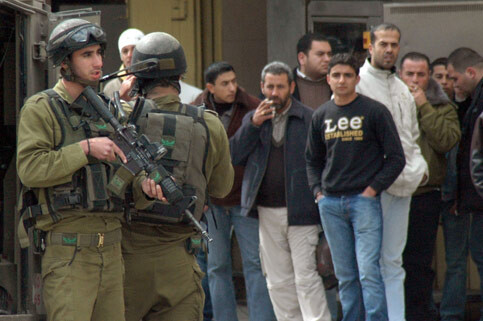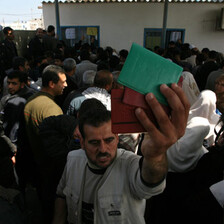The Electronic Intifada 20 February 2008

Israeli occupation forces invade the West Bank city of Tulkarem and arrest 12 Palestinians from one of the city’s cafes, 20 February 2008. (Mouid Ashqar/MaanImages)
“You are either with us, or with the terrorists,” said US President George W. Bush a couple of days after the horrendous 2001 attack on the World Trade Center and the Pentagon. Prior to this statement, Bush had made it clear that his is a “crusade” against “terror” and “the powers of darkness.” This simplistic binary approach employed by the American president and his right-wing administration — supported wholeheartedly by the powerful CNNized media — attempts to close the door in the face of a third way: a more rational, secular and democratic one that fights terrorism whether nihilistic or state-sponsored.
Its reductive, hegemonic right-wing, orientalist ideology that informs most western politics deliberately ignores the simple rational fact that the existence of Arab terrorists does not, and should not, by any means lead to the sweeping condemnation of the Arab Nation. If one is to follow the same logic that informs such ideology, one, then, should condemn the US, and Christianity for that matter, for the terrible crime committed by Timothy McVeigh.
The oppressed all over the world, Palestinians in particular, grieved the loss of innocent lives in New York, Pennsylvania and the capital that day. But Palestinians have been the victims of the same kind of disregard for human life since 1948, inflected on them by American-made weapons. And now it’s the Afghani and Iraqi peoples’ turn to get stuck between the American “with us” or “against us.”
The “third way” that secular intellectuals defend, condemns terrorism and supports the fight against it. However, the criterion it follows is a universal one. That is, if the US is prepared to censure Israel for its illegal occupation of the Gaza Strip and the West Bank, and for its massacres of civilian Palestinians and extra-judicial assassinations of political leaders, expropriation of Palestinian lands, demolishing of houses, building of illegal Jewish settlements, “third way” supporters should not have a moral problem supporting the “western” fight against terrorism. Further, if the US stops its support for imposed, corrupt dictators in the Arab world, and helps in nurturing better circumstances for millions of the oppressed and their democratic representatives (i.e., unions, women’s movements, secular parties, etc.) there will be a limited base for “fundamentalism” to grow. Of course, whether Jewish, Islamic, Hindu, or Christian, religious fundamentalism is to be condemned by secular intellectuals, regardless of what it promises.
No fight against terrorism can ignore the circumstances that breed it; nor can it equate the struggle of a people for freedom and national independence with meaningless, nihilistic acts of hopelessness; nor should it apply a racist double-standard policy. All victims of terrorism — whether Palestinians, Iraqis, Rwandans, Congolese, Vietnamese, Muslims, Christians or Jews — are equal. To murder 500,000 innocent Iraqi children and consider it “worth the price” as the former US Secretary of State Madeleine Albright stated, is in no way less inhumane than the terrorist attacks in New York. Reason and rationality, within the Iraqi and Palestinian context, are not referred to because they are simply “them,” not “us.” Whereas in New York, it is “us” who are bleeding. Our suffering is not to be compared to “theirs;” theirs is worth the price. Our mothers cannot bear the pain of losing their loved ones, whereas “their” mothers send their children to be killed. Their “irrational,” “barbaric” terrorism against “us” will be met with our technological “crusade;” a war that will eradicate “them” completely.
Here comes the importance of the secular interested who are neither with Bush, nor with the terrorists. They are for international peace and security that protect all and favor none. Terrorism should not be tolerated. Nor should it be defined only by those who see their mission as a “crusade.”
The abundant ignorance of numerous TV pundits, in America and abroad, is not surprising at all. One needs to mention the “spectacular” Gulf War and the celebrated bewildering state terrorism that accompanies it. But are the events of 11 September 2001 really surprising? Asked differently, can these events be understood without contextualizing them? A day after the attack, one of the American guests on a famous South African radio program, the Tim Modise Show, claimed that American adventures overseas amount to “misunderstanding” and ignorance of other cultures, whereas the terrorist attacks on the World Trade Center and the Pentagon are malicious.
Prior to the disaster that befell America, President Bush had decided to restart the missile defense program. And he was adamant not to intervene and try to put an end to the Israeli aggression in Palestine — a just peace in the Middle East seems so slippery, and the sole superpower just shrugged its shoulders. If a “great power” such as the US decides to withdraw from one of the most important conferences taking place in the 21st century, namely the World Conference Against Racism in Durban, because of the conference’s desire to support the Palestinian people and to discuss reparation for those who suffered from slavery, it becomes obvious, then, that anxiety, anger and uncertainty are to prevail. As many intellectuals have argued, the Durban Conference was a very serious missed opportunity for the US to rethink it role in the new millennium.
The only solution is not war, but rather a serious, comprehensive attempt on the part of the American government to put it off, and fight all forms of fundamentalism and terrorism by creating better conditions for those whose lives have become indistinguishable from their deaths. Will Bush, or his successor, ever try to understand it? I very much doubt it.
Haidar Eid is Associate Professor in Cultural Studies at Al-Aqsa University in occupied Gaza.





